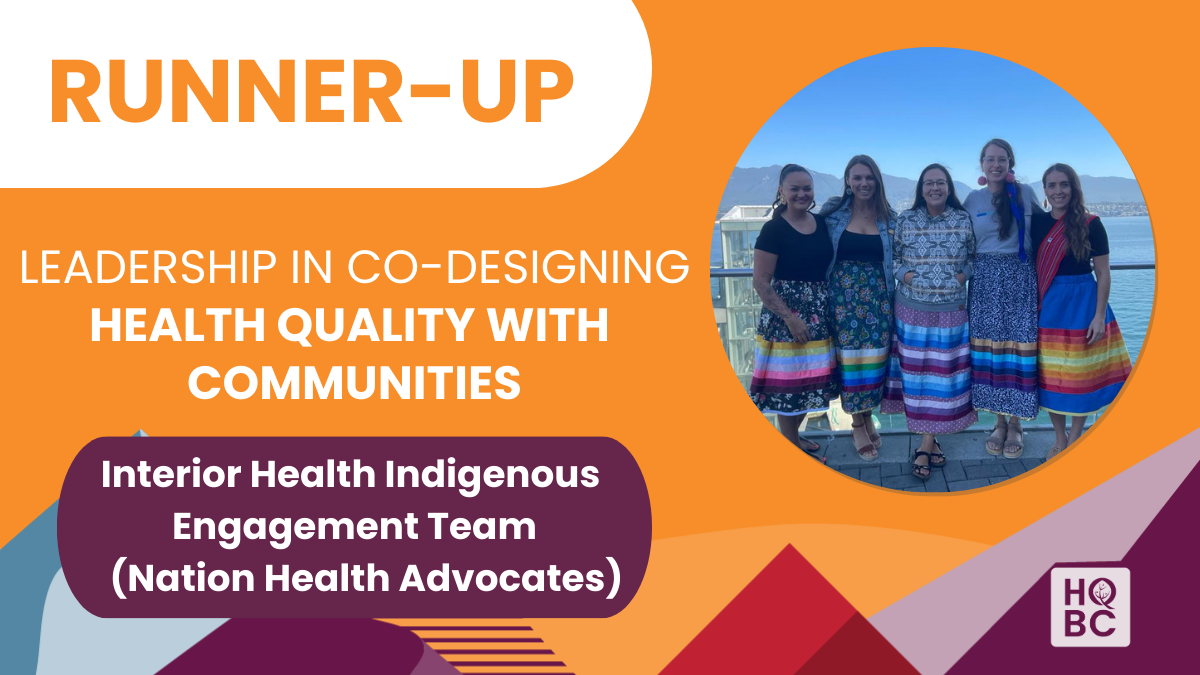- 2025
|
- Runner-Up
|
- Leadership in Co-Designing Health Quality with Communities
The Indigenous Engagement team at Interior Health (IH) successfully implemented a unique approach to co-creating health with First Nations and Métis communities in the Interior region through the co-development of Nation-based Health Care Advocate positions. This approach was founded on collaborative engagement, self-determination, and shared accountability between IH and each Nation in the Interior.
These Nation-based Advocate roles were co-led in partnership through all stages of development, including drafting job descriptions, joint hiring and recruitment, and continuous co-management between each Interior Nation and IH. Nation Health Advocates are accountable to both IH and their respective Nations and work to strengthen Nation-IH relationships and advocate for Nation interests and priorities within the health care system. They also facilitate Nation-IH Letter of Understanding (LoU) joint committee meetings and take direction from partners at those tables.
The Nation Health Advocates work to create systemic change within IH to make services more culturally safe for Indigenous People and address anti-Indigenous racism and discrimination. They take initiative to identify systemic issues and areas for improvement within the health care system and collaborate successfully with internal and external partners to achieve desired outcomes as defined by Nations in partnership with IH. The Métis Health System Advocate commented, “During my time as the Métis Nation BC Health Advocate, we were able to accomplish so much that directly impacts Métis who are interacting with the health system. We were able to not only build the MNBC-IH Métis Health and Wellness Plan but start actioning many of the goals. The Plan will continue to lead the good work of improving health and wellness outcomes for Métis individuals, families and communities in the region.”
An example of work led by a Nation Health Advocate was a collaboration with IH leaders and contracted services for Detox and Supported Recovery to improve intake processes, address experiences of discrimination, and overall difficulty with barriers for Indigenous People to access these programs. Through the work of the Nation Health Advocate in Ktunaxa territory, as part of a collaborative team with allyship from leaders in East Kootenay Clinical Operations, barriers have been significantly reduced, the process simplified and streamlined, and strong relationships have been built with the contracted recovery service. A Nation-based cultural safety educator was also brought in to provide cultural safety training from a Ktunaxa perspective to further enhance quality of care.
The Nation Health Advocates are also developing Nation-based Health and Wellness Plans to operationalize the commitments outlined within Nation-IH LoU agreements. The development of these plans involved robust engagement with communities, IH and Nation partners to ensure that plans are distinctions-based, reflective of current Nation priorities, and developed in partnership. The Nation Health Advocates are the primary stewards of this work, who engage with partners to ensure alignment across organizations. The MNBC-IH Métis Health and Wellness Plan, for example, contains robust goals for the next five years and has been designed to achieve equitable health outcomes and strive for excellence in health care provided to Métis individuals, families and Chartered Communities. This will be achieved through effective decision-making and shared accountability that will reduce barriers and increase access to health services.
With these Nation Health Advocate roles, IH has set a precedent for how to achieve true partnership with Nations through collaborative hiring and co-management of Indigenous roles within the health care system. Through this new approach and the ongoing work of the Indigenous Engagement team, IH is truly honouring its commitment to self-determination for Indigenous People in the Interior of BC, and the profound impact of these partnerships is rippling across the health care system.
Ulkatcho First Nation (UFN) shared, “In co-designing these positions with First Nations, Interior Health has done an incredible job in showcasing how a health authority and an Indigenous Nation/Community should work together. All work with our people and for our people should be driven by our people (nothing about us without us). Without this Nation-based Health Care Advocate position, UFN would not be able to engage with the health authority in a meaningful way. This initiative has strengthened the relationship between IH and UFN and we are excited to work collaboratively to improve the health and well-being of Ulkatcho’tens. Chanalya IH!”


